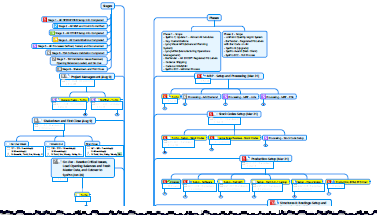You feel like you're approaching burnout – what techniques might help avoid this?

My Coach and I sometimes practice what she calls "Real-Time Coaching" - brief discussions or email exchanges when I'm stuck and need some options or objective advice to consider.
Recently, I had the need for this type of focused help. I knew I was approaching burnout because of a large and complex client project, where I am both the Project Manager and Subject Matter Expert (SME) in a number of areas. The impending burnout was causing me two problems:
- The burnout itself.
- The lack of creativity when my brain had almost turned to mush because of the burnout ... especially when it was the end of a month and I hadn’t yet come up with a topic for my e-newsletter!
To address the latter, I turned to one of the sources I use to stockpile ideas, for a time just like this - a Moleskine journal where I logged notes from a 2018 session with my Creativity Coach - and found a topic she had suggested, "Burnout."
Hmmmm ... burnout could be both a topic and a meta-topic, since I was approaching burnout and needed some advice on how to avoid it AND the burnout was nuking my creativity. That was PERFECT!! I shared this idea with Coach, asked her for some thoughts, and moved on to other things.
Avoiding Burnout – Quick Thoughts from Coach
A few hours later, I reviewed the bullet points Coach had emailed me. Here are the ones I found most applicable:
- Aspects of Burnout – Can be physical, mental, and emotional. Can have one or two or all three.
- Potential for Spillover – Can have in one or more areas of life - personal, professional - and can have ripple effect from one area to the other, unless we consciously work to compartmentalize the burnout and avoid spillover.
- Physical Burnout – Our bodies will take care of burnout if we don’t - illness, fatigue, mistakes, low resistance, harsh words/thoughts, sleeplessness - and usually with less-than-desirable consequences.
- Acknowledge and Address Burnout Before It Consumes You – Delegate. Hire others for things you previously did yourself. Lower your expectations - for yourself and for others who support you. Let those around you know what’s going on. Take advantage of the "Gracious No" (how to decline a request in a respectful manner). Practice Do or DANES (Delegate - Automate - Negotiate - Eliminate - Simplify) with emphasis on DANES.
Note that I had already applied one key point in Coach's last group of tidbits - I had delegated some of the thinking for this e-newsletter to her!
ERP Implementation Project – Some Background
An ERP (Enterprise Resource Planning) implementation project is the IDEAL project for me! Why? Because it requires all the following knowledge and skills I've honed in 35+ years of client service and running my own firm - Financial Accounting, Standard Costing, Cost Accounting, Application Development, Relational Database Design, and Architecture of ERP Systems.
The problem with a project like this is I become a Foxhole Friend with my client - I get down in the trenches and root around in the muck with them. For this particular project, there was a LOT of muck, since the ERP system needed several third-party modules to work well in my client's environment ... and I kept finding inconsistencies between and among the assumptions used by the various software components. The Shop Floor Data Collection (SFDC) system and the Quality Management System (QMS) each made different assumptions about product setup in the core ERP system. In fact, one problem was so severe, it threatened the use of the selected QMS in Phase 2 of the implementation.
Applying Coach's Advice
Coach's advice also provided a number of action steps I could quickly take.
In terms of delegating or hiring others - my client has recently brought on board two persons dedicated 100% to the project and made them fully available to me, plus I am involving two of my own associates in more technical aspects of the work. The challenge with additional persons is the immediate need for me to orient them to the project and this ERP system. Hopefully, this time expenditure is quickly offset by their ability to apply what I've taught through one example to the many test cases required to successfully test and implement the ERP system.
I also asked myself what tasks only I could handle and needed to retain, then looked for ways to offload the others. Here is how I evaluated a few large items on my "To Do" list:
- Cost Accounting – How to handle this when the ERP system handles standard costs in an awkward manner - Delegate.
- Reporting – Many reports will need to be modified or developed anew - Delegate.
- Foreseeing Technical Issues – How to anticipate Phase 2 issues, given how we are building things in Phase 1 - Retain.
- Production Fallout – What allowances we need to make for scrap, retention samples, destructive testing, and other situations reducing a job's yield - Delegate.
- Mapping and Managing the Overall Project Plan – How to determine, in a complex project (the top quarter of the “project map” is shown below), what implementation tasks are Most Important Now (MIN) - Retain.

With this simple exercise, I found perhaps 100 hours of work to hand off to others.
In Closing
If you're approaching burnout, you might try applying some of Coach's tips just as I did.
If you're approaching burnout because of an ERP system implementation, please contact me - you likely need a Foxhole Friend to get in the trenches with you.
Sincerely,

Todd L. Herman






